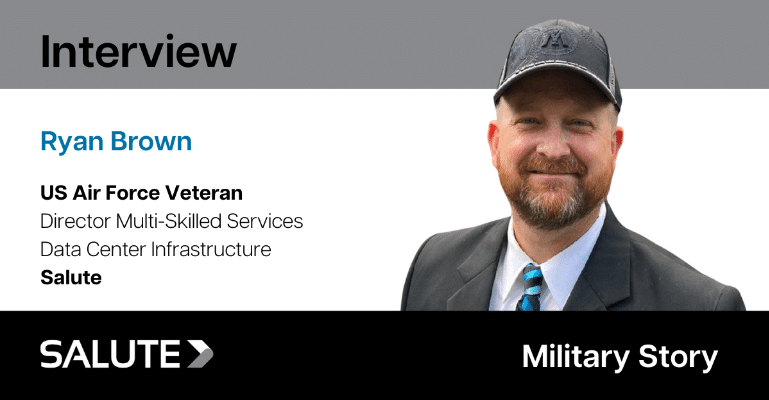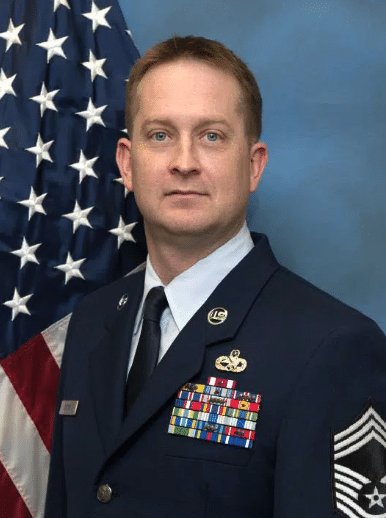Lee Kirby, Salute Co-Founder, and retired Army colonel interviewed Ryan Brown, US Air Force Veteran and Director Multi-Skilled Services Data Center Infrastructure at Salute.

What is the Salute Military Community?
The Salute Military Community is a unique cohort of veterans and the military community who serve as examples of the value their experiences bring to our industry. The Military Community supports Salute’s mission and strives to achieve our shared vision of providing veterans and military spouses career opportunities in the data center industry. We are proud of the military community for giving back to other members seeking to start careers in this industry.
Before we dig in, our readers would love to get to know you a bit. Can you tell us a bit about your childhood “backstory”?
I was the youngest of six kids and grew up in a small farm town in rural Illinois. I went to a very small public school, all 12 years in the same building. In my free time, I would work on the farm. Farming was the only job I had before I joined the Air Force. Farming taught me a lot about responsibility, accountability, and appreciation for finishing the job. But I also longed to see what else was out in the world, which is why I investigated joining the military. I left for the Air Force about 3 weeks after graduating high school.
And what are you doing today?
Today, I’m retired from the Air Force and have been working with Salute for just over 3 years. Since the Air Force, I returned to that small rural town and continue to help my dad on the same farm I grew up on. I’ve been married 24 years, and we have two children. My 22-year-old daughter Macie, and 16-year-old son, Aiden. My wife is from the same area, so we wanted to go back to where our families were, plus we appreciate the small town atmosphere and wanted our kids to experience that.
Can you tell us a bit about your military background?
I joined the Air Force when I was 18 years old looking for a way to gain experience in a service or trade, looking for a way off the farm. My goal was to get trained in vehicle maintenance, HVAC, plumbing, fabrication, or another type of career that I could relate to and translate to the civilian world. I joined “open general” and selected some trade preferences for career field assignments. I also only intended to serve the four-year contract, then return to the farm. Once I completed basic training, they assigned me to a career field, tactical aircraft maintenance. It wasn’t on my wish list because I was unfamiliar with that type of work. When I completed technical training, I became an F-16 Crew Chief.
My first assignment was Aviano Air Base in Italy. I arrived there during the conflicts in the Balkans, so my first assignment was very busy with a high operations tempo. I was able to travel all throughout Europe during that time, mostly for work. After Italy, I went to Arizona and then Korea. I started taking college classes and I ended up re-enlisting for a second term and ultimately stayed for 25 years. I stayed involved with the F-16 for the first 15 years of my career, including a year with the United Arab Emirates Air Force and Air Defense Force in Abu Dhabi.
Then, I transitioned to the F-35 in Florida and participated in standing up one of the first F-35 operational training units. Later, I was assigned to the E-3 AWACS mission in Oklahoma. I finished my career with Air University in Montgomery, Alabama as the 15th Director of the Air Force Enlisted Heritage Research Institute. The Air Force taught me many things such as leadership, followership, problem solving, and they provided formal technical training, as well as funding my formal higher education.

Do you have a memorable story from your military career that taught you valuable lessons?
I have plenty of stories and learned many life lessons during my career. I would say one of the most memorable was when I was assigned to Aviano AB Italy. I was new to the Air Force and still trying to find my place. We were working nights and just wrapped up for the weekend when the Command Post called my unit and asked us to generate a couple of F-16s for an emergency mission. There were only a few of us left on site so we jumped into action and started preparing the aircraft.
The pilots showed up and told us the Pope was visiting Sarajevo and they found explosives along the route and asked us to provide air support so he could travel in under the cover of darkness to prevent any assassination attempt. We got the jets started up and sent them out when I noticed they immediately stopped on the taxiway. Looking closer, a larger aircraft had recently taken off and their exhaust peppered the taxiway with rocks that we could see in the F-16’s taxi lights. We called Base Operations to send a street sweeper because ours was down. They said they had to call someone in which would take significant time. I knew we would lose our launch window if we waited, so I grabbed a broom and headed out to aircraft and started to sweep the rocks off myself. I was able to clear the way and the jets took off.
The mission was successful, nothing happened to the Pope. What I learned is that the mighty Air Force isn’t infallible, we almost failed in that mission because of poor planning (not sending the sweeper out after the large aircraft took off before the team was sent home). But the biggest lesson was that I could make a difference, a little innovation and creativity at any level is welcomed and important. That helped me in my career, it helped me open up and offer solutions in any scenario, not just depending on existing policy or procedures to have all the answers.
Do you think your experience in the military helped prepare you for business or leadership? Can you explain?
Absolutely, the leadership experience alone was enough to prepare me for the business world, but the formal education opportunities allowed me to grow personally and professionally. In most scenarios, the military is a fast-paced environment that requires critical thinking and adaptability. Critical thinking is a rare attribute, but it’s essential to success in industries like ours, performing in mission critical space. It involves preparation and forward thinking to anticipate issues, gaps, inefficiencies, and improvement areas. The Air Force provided me with crucial critical thinking experience and training. Proper planning is essential to success in any organization.
Is there someone you are particularly grateful to for helping you reach where you are today?
There are plenty of people that have touched my life, altered my career path, and guided me to get where I am today. But if I had to call out the most important one, it would be my wife, Jennifer. She made it possible for me to focus on my career, take the critical deployments and assignments, give 100% to every position I held, because she took care of the family, and our household.
We were married about two years when we had our first child, and I deployed to Korea for one year just five days after our daughter was born. This left my wife to manage things at home, learn to be a mother, raise our daughter, maintain our household, and support me while deployed. I had to leave her several times after that, sometimes for a year, sometimes for six months, and sometimes just for a few weeks… but every time she carried our family on her shoulders while giving me the ability to focus on my job, rise the ranks and be successful. The “goodbyes” never got easier, especially after our second child and when both kids were old enough to understand I was leaving. But knowing I had her to carry the torch and take care of our family while I was gone, made those “goodbyes” much more palatable. Military spouses are cornerstones in the foundation of our national defense and should be maintained as national treasures.
Why is helping the military community and veterans get into this industry so important to you?
It’s important because I can relate to veterans, especially as they are determining their future and figuring out what to do next. After I retired from the Air Force, I worked as the Lead Military and Family Readiness Specialist for the state of Illinois. This was a federal position within the Illinois National Guard. Each state has a similar role that provides a team of professionals to assist veterans from any service or component in financial, medical, professional, or personal support needs. That position allowed me to see and understand that veterans come in all different shapes and sizes in reference to their “service.” I was focused on the retirees and folks getting ready to retire with 20 years or more, but that job opened my eyes to see how veterans are all ages and need help in every stage throughout their career. Anyone with a DD 214 could need help in their transition or even years after their transition, could be six months, or six years, there are many veterans out there needing help or mentorship. Salute impressed me by their efforts to support veterans and their understanding that veterans already come with valuable training, maybe not in a data center – but training in understanding people, leadership, commitment, focus, communication, and endurance.
If you could inspire a movement, what would it be?
Get out and help in your community. Communities are always looking for volunteer support for events, functions, or groups. The size of your community does not matter. You would be surprised how much structural support there is to help people, but they just need volunteers to support it. My wife and I support several monthly events around the community and there always seems to be more that can be done.
How can our readers follow you online?
I have a LinkedIn page but between Salute, the farm, and my family, I don’t have much time to produce content!
